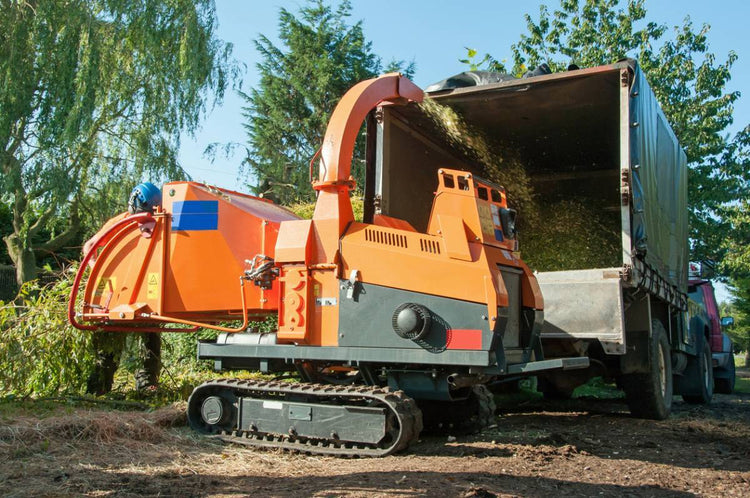Wood chippers have revolutionised the way we manage and use wood across a range of industries. From forestry to landscaping and construction, these powerful machines have become an essential tool for processing wood waste efficiently. Read on to learn more about how chippers have transformed modern wood management.
The wood industry in the past
Before the introduction of modern machinery, the handling of forests and wood resources relied heavily on manual labour and traditional tools. Historical processes involved various techniques and practices to harvest, transport, and make use of wood from forests. Here is a brief overview of how forests and wood resources were handled in the past:
Harvesting techniques
With no access to chainsaws or mechanised felling equipment, trees were typically felled using axes or saws. This required the use of skilled labourers, who would carefully select and cut down trees based on their size, quality, and intended use. The felled trees were then manually transported to designated areas for further processing.
Log transportation
Transporting logs from the forest to a central location or mill was also a challenging task. In many cases, logs were dragged or rolled manually to create makeshift trails or skid roads - horses or oxen were often used to help pull or carry the logs over difficult terrain. This process required a significant amount of physical effort and coordination.
Wood processing
Once the logs were transported, they would be processed into usable wood products. This involved sawing or chopping the logs by hand using manual saws, axes, or adzes - the aim was to convert the logs into boards, beams, or other desired shapes, which is where skilled craftsmen came in handy.
Manual labour in woodworking
Woodworking activities, such as carpentry and joinery, were carried out using hand tools like chisels, planes, and hammers. These tools required craftsmen to shape and assemble wood pieces into furniture, structures, or other functional items. This was a time-consuming process that required strong attention to detail.
What are wood chippers?
Wood chippers are machines used to process wood into smaller pieces or chips, and are commonly used in landscaping, forestry, and construction industries. Wood chippers are designed to break down tree branches, trunks, and other wood waste into smaller, more manageable pieces, which can then be used for various purposes such as mulching, composting, or fuel. They typically consist of a hopper, a feeding mechanism, a chipping or shredding mechanism, and a collection system for the processed wood chips.
How do wood chippers work?
Wood chippers work by combining feeding mechanisms, cutting blades, and collection systems. These are the typical components of a wood chipper:
Feeding mechanism
Wood chippers have a hopper or chute where the wood waste is fed into the machine. The hopper is typically designed with safety features to prevent operators from coming into contact with the cutting blades - some chippers may have a hydraulic feeding system that helps in pushing the wood waste towards the cutting mechanism.
Cutting mechanism
The cutting mechanism of a wood chipper includes sharp blades or knives that are strategically positioned on a rotor or disc. As the wood waste enters the cutting area, the rotating blades or knives cut and shred the wood into smaller pieces or chips. The size of the chips can be adjusted by changing the spacing or configuration of the cutting blades.
Collection system
Once the wood waste is processed by the cutting mechanism, the chips are discharged through a chute or outlet. Some wood chippers may have a collection bag or container attached to the outlet to collect the chips, while others may deposit the chips directly onto the ground or into a trailer.
Engine and power source
Wood chippers are powered by internal combustion engines, typically petrol or diesel. The engine provides the necessary power to drive the cutting mechanism and other components of the machine. Electric-powered wood chippers are also available, which require a power source such as an electrical outlet or a generator.
Safety features
Wood chippers are equipped with various safety features to protect operators and prevent accidents. These may include emergency stop buttons, safety shields, and feed control systems to regulate the feeding speed and prevent overload.
The benefits of wood chippers
Wood chippers are integral to a range of industries. These machines are designed to process wood waste efficiently, leading to numerous benefits:
- Wood chippers help reduce the volume of wood waste by converting large branches, limbs, and other wood debris into smaller chips or pieces. This simplifies handling, transportation, and disposal.
- Chipped wood can be used in various ways, such as mulching, composting, or biomass energy production - this helps maximise the value of wood waste by transforming it into useful products or renewable energy sources.
- By using wood chippers, industries can save on waste disposal costs. Rather than paying for expensive landfill fees, wood waste can be processed and repurposed on-site or sold as a valuable byproduct.
- Wood chippers promote sustainable practices by reducing the amount of wood waste sent to landfills, which helps minimise greenhouse gas emissions and environmental pollution. Using wood chips for mulching or biomass energy also reduces the reliance on non-renewable resources.
- Wood chippers streamline wood waste management processes by quickly and efficiently processing large volumes of wood debris. This saves time and labour in comparison to manual or traditional disposal methods.
- Wood chippers are versatile machines that can handle various types of wood waste, including branches, stumps, pallets, and construction waste. They can be adjusted to produce different sizes of wood chips to meet specific needs.
- Wood chippers are equipped with a number of safety features, such as emergency stop buttons and safety shields, to protect operators from accidents and injuries.
Industries that require wood chippers
Wood chippers are used in various industries for processing wood waste and improving wood management practices. Here are some of the industries in which wood chippers are most commonly used:
- Wood chippers play an important role in the forestry industry for processing tree branches, limbs, and other woody debris generated during forest harvesting and maintenance operations. Chipped wood can be used for mulching, biomass energy production, or as raw material for manufacturing wood-based products.
- In the landscaping and tree care industry, wood chippers are used to process tree branches, stumps, and other green waste. Chipped wood can be used for mulching flower beds, pathways, or as a ground cover to improve soil health and moisture retention.
- Wood chippers are often used in the construction and demolition industry to process lumber waste, pallets, and other wood materials generated during construction projects - chipped wood can also be recycled or used for biomass energy production.
- In fact, wood chippers are an essential aspect of the biomass energy sector, where they are used to process wood waste into wood chips or biomass fuel. These wood chips can be used as a renewable energy source in biomass power plants, heating systems, or for the production of biofuels.
- Wood chippers are sometimes used in sawmills and woodworking facilities to process wood scraps, offcuts, and trimmings into usable wood chips or mulch. These chips can be used for further manufacturing processes or even sold as a byproduct.
- Municipal waste management departments often use chippers for processing tree branches, shrubs, and other green waste collected from parks, gardens, or public areas. Again, this chipped wood can be composted, used for mulching, or converted into biomass fuel.
Compact wood chippers and more at Rock Machinery
Here at Rock Machinery, we pride ourselves on being specialists in a whole range of garden machinery; including log splitters, chippers and stump grinders. From domestic to professional, we’ve got a product for you. Our knowledgeable and friendly staff are on hand to help you figure out the exact product you need from our wide range of products; from the mighty 35-ton Pro-Elite petrol to a 12-ton plugin electric splitter. Rock Machinery offers the UK’s most extensive range of log splitters and other heavy-duty garden machinery, so whatever your need or budget, contact us to find the machine for you.

